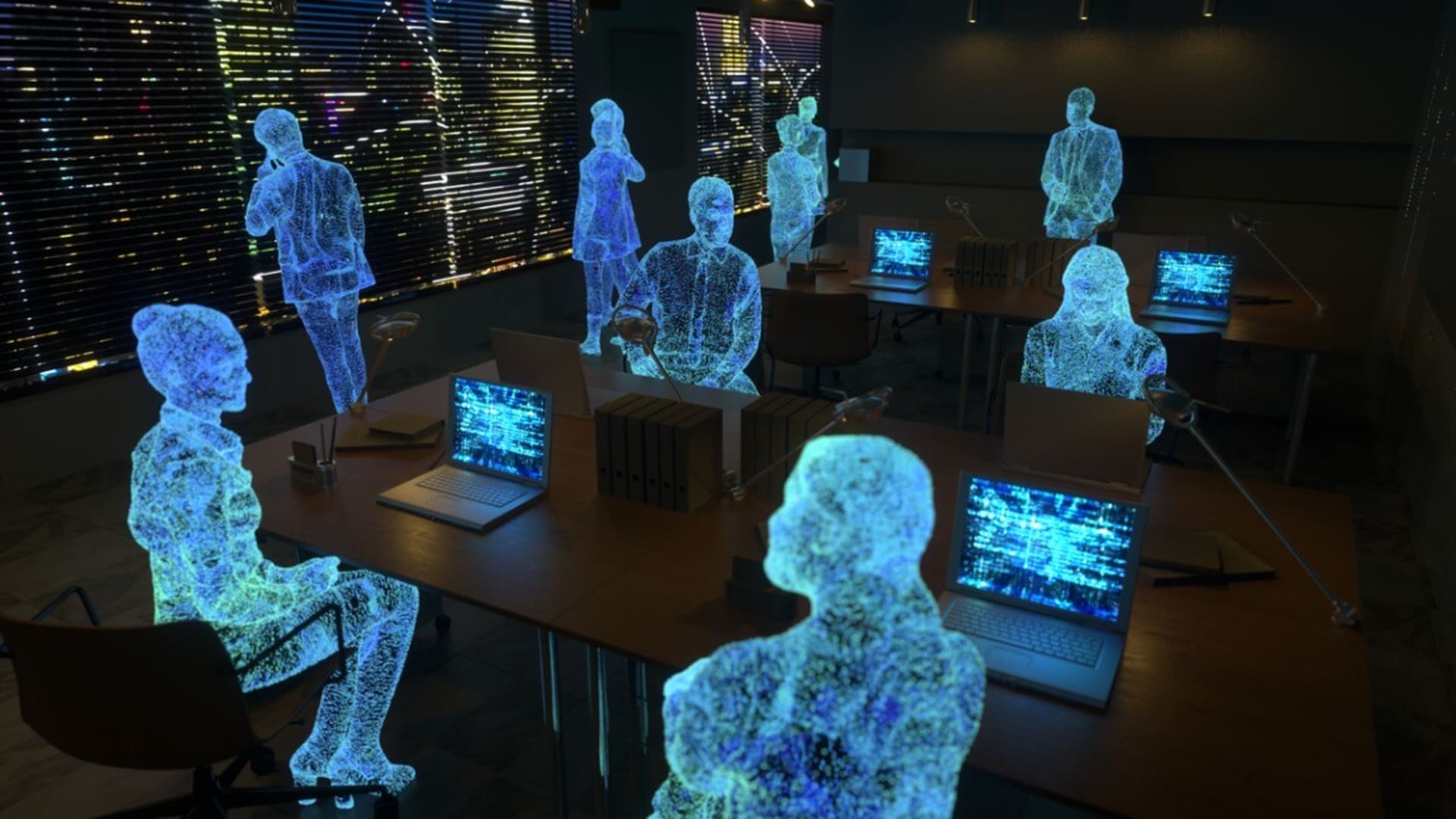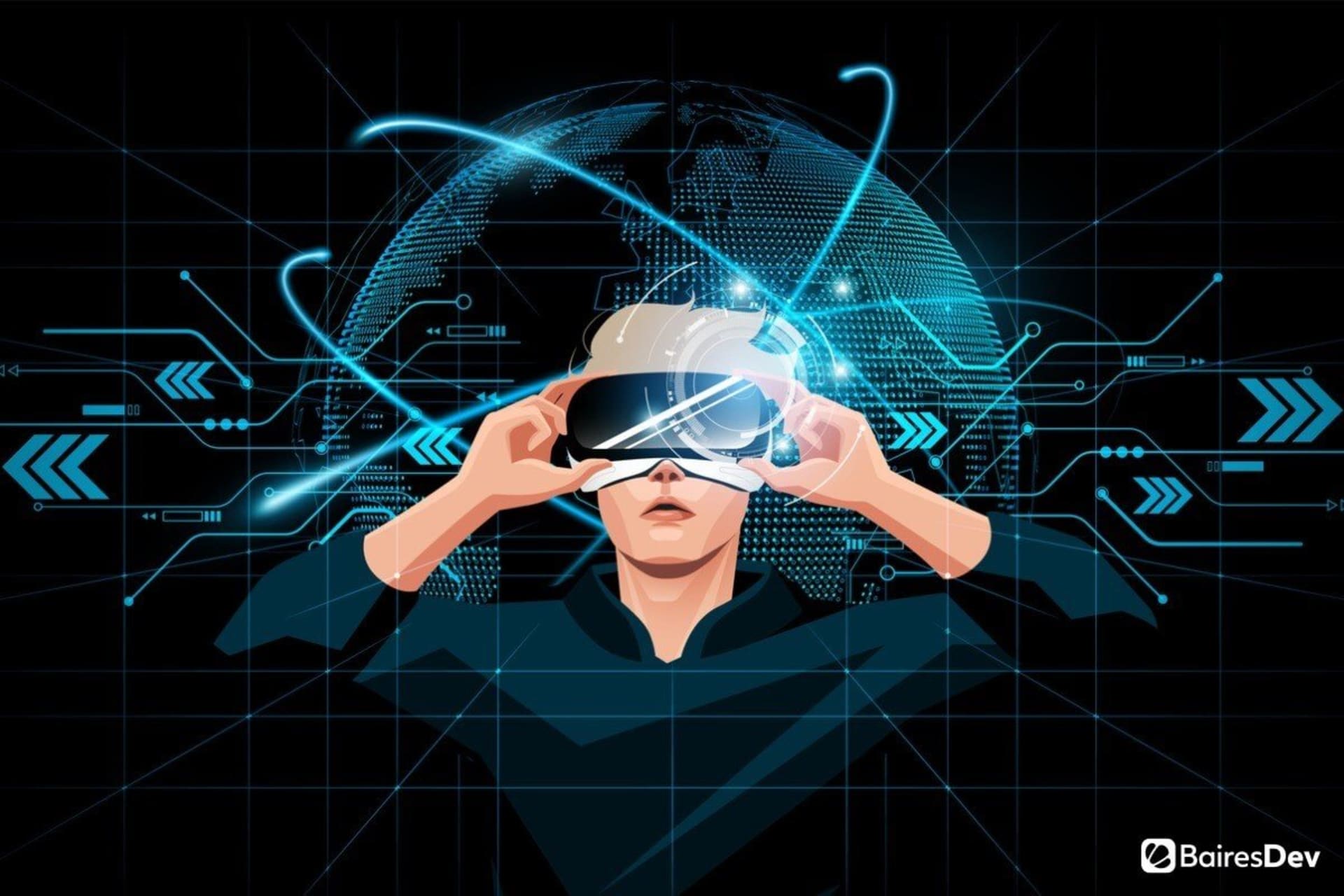Metaverse Development Services
Our Metaverse development services boast a 96% client retention rate. With teams ready to start in as little as two weeks, you can confidently create high-engagement Metaverse applications.
500+ companies rely on our top 1% tech talent.
Metaverse Development Services We Provide
Custom Metaverse Platform Development
Businesses can struggle to differentiate themselves in a competitive digital world. A custom metaverse platform solves this by creating a unique, branded interface. This boosts user engagement with immersive interactions, building long-term value for your enterprise.
Our developers build scalable, integrated platforms powered by blockchain and AR/VR. From virtual collaboration spaces to branded customer experiences, our Metaverse platforms are optimized for mobile and the web. As a top metaverse development company, we hire the top 1% LATAM tech talent to deliver industry-leading solutions.
AR/VR Integration Services
An immersive virtual experience has to integrate augmented and virtual reality. This can be complex and resource-intensive. VR/AR integration solves this, delivering interactive experiences that improve training, collaboration, and customer engagement.
Our Metaverse developers specialize in embedding AR/VR into metaverse projects using platforms like Unity, Unreal Engine, and WebXR. Our VR/AR solutions are low latency, high resolution, and intuitive, and they are ideal for anything from 3D product showcases to employee training simulations. Our AR/VR services stand out with scalable virtual environments that integrate with decentralized platforms.
Metaverse Consulting
Navigating the metaverse without a clear strategy can waste resources and make you miss opportunities. A clear metaverse strategy aligns your investments with business goals, helping you drive innovation and seize new opportunities.
We analyze your organization's needs and build a roadmap to your goals. From market research to technical recommendations, our consultants guide every step of your metaverse journey. The end result is scalability, security, and a competitive edge. With over 15 years of experience in software development, our consulting expertise helps you enter the Metaverse with confidence.
Blockchain-Based Development
Securing digital transactions and assets in the metaverse protects your customers. Blockchain development supports decentralized platforms, secure ownership, transaction transparency, and interoperability.
Our Metaverse developers are blockchain specialists who implement smart contracts, NFT marketplaces, and tokenized assets for trustless use. Via Ethereum, Polygon, and Hyperledger, we build decentralized, secure platforms. We also prioritize compliance with industry standards, for innovative, reliable blockchain-based metaverse solutions.
Enterprise-Grade Scalability Solutions
Rapid growth or unexpected demand spikes can cripple metaverse systems. Enterprise-grade scalability keeps your metaverse app stable even with high user volumes.
We optimize backends with load balancing, distributed databases, and caching. Our metaverse development is cloud-ready. We use platforms like AWS, Azure, and Google Cloud for scalability and performance. Our experience with large-scale systems and advanced cloud platforms delivers scalability for metaverse projects.
Metaverse API Development and Integration
Disconnected tools and systems can hurt your team’s productivity and collaboration. Metaverse API development and integration connect your virtual spaces with existing enterprise tools. This lets your teams synchronize their data and simplify their workflows.
We design custom APIs integrating CRMs, ERPs, and other enterprise platforms. Our APIs use RESTful and GraphQL protocols for real-time data sharing and compatibility across platforms. Our expertise with virtual reality integration simplifies your workflows.
Rolls Royce case study
Rolls Royce turned to BairesDev to develop an efficient, user-friendly mobile app. A two-week discovery process with the Rolls Royce product owner identified a comprehensive list of functionalities, data streams, and displays required to meet their clients’ expectations for a mobile SDS. Read the entire Rolls Royce case study.

Key Things to Know About Metaverse Development
Best Practices for Metaverse Development
As your user base grows, your metaverse platform needs to keep pace. A scalable architecture adapts to increasing demand without compromising speed or reliability. This keeps your platform up and running even during traffic surges or feature expansions.
Use cloud solutions like AWS or Azure for dynamic scaling. Implement load balancers and distributed databases to stay in step with high traffic volumes.
Design your platform with a modular approach. This makes it easy to add features and integrations as user needs evolve.
Use caching tools like Redis or Memcached to store frequently accessed data. This reduces latency and improves response times.
You’ll enhance user engagement by using WebSocket protocols. These support real-time communication and interactions in your metaverse environment.
Security and data integrity are paramount in any metaverse project. Enterprises often handle sensitive user data and digital assets, making strong security protocols a top priority. Ensuring robust protection safeguards your reputation and builds user trust.
The blockchain secures digital transactions transparently and immutably. Use smart contracts to automate processes like payments and digital asset transfers in a tamper-proof way.
End-to-end encryption prevents unauthorized access to sensitive information. This is especially critical for metaverse development companies handling personal and financial data.
Adhering to industry standards like GDPR or HIPAA minimizes legal risks. It keeps your metaverse platform in step with global data protection laws, avoiding penalties.
Proactive security testing identifies vulnerabilities early. Regular audits, penetration testing, and code reviews protect your metaverse solutions from evolving threats.
A fragmented metaverse experience can alienate users and reduce engagement. Integration across platforms lets users access your system from any device or platform. By unifying virtual domains, you can offer a consistent, satisfying experience.
Your metaverse applications must work smoothly on mobile devices, desktops, VR headsets, and other platforms. This ensures accessibility for a wide range of users and increases engagement.
Building custom APIs connects your metaverse platform to tools like CRMs and ERPs. This integration improves workflows, collaboration, and data management.
Flexible, scalable infrastructures support long-term growth. These systems adapt to decentralized platforms and evolving technologies, keeping pace with user demands.
Real-time data sharing lets updates reflect instantly across platforms. This boosts collaboration, keeps information current, and creates a better user experience.
Why Choose BairesDev for Metaverse Development

Nearshore, Timezone-Aligned Talent
Collaboration in metaverse development thrives on real-time communication. BairesDev’s nearshore, timezone-aligned teams deliver tight project management and quick decision-making. This shortens project timelines and minimizes delays, critical for building high-performance metaverse solutions. It also keeps our teams available during peak business hours, reducing handoff times for critical tasks.
Custom/Tailored Solutions
Your metaverse project has a unique vision. At BairesDev, we specialize in building custom metaverse platforms. From immersive experiences to blockchain-based solutions, our metaverse development team drives engagement and measurable outcomes. We build each project with scalability in mind, collaborating closely with your internal stakeholders. This creates a final product that fits with your strategic vision.
Top 1% of Tech Talent
BairesDev rigorously vets over 2.2 million applicants annually, selecting only the top 1% of metaverse developers. Our developers are experts in AR/VR, blockchain, and advanced API integration. They bring extensive experience across diverse industries, so they’re equipped to meet rigorous technical requirements.
Our process. Simple, seamless, streamlined.
During our first discussion, we'll delve into your business goals, budget, and timeline. This stage helps us gauge whether you’ll need a dedicated software development team or one of our other engagement models (staff augmentation or end-to-end software outsourcing).
We’ll formulate a detailed strategy that outlines our approach to backend development, aligned with your specific needs and chosen engagement model. Get a team of top 1% specialists working for you.
With the strategy in place and the team assembled, we'll commence work. As we navigate through the development phase, we commit to regularly updating you on the progress, keeping a close eye on vital metrics to ensure transparency and alignment with your goals.
Frequently Asked Questions
What is a metaverse development company, and why should I hire one?
A professional metaverse development company can build immersive digital environments, platforms, and applications. They hire metaverse developers who understand blockchain, virtual reality, augmented reality, and decentralized platforms, delivering a seamless, scalable metaverse project. Their expertise spans complex areas like integrating decentralized networks and optimizing cross-platform compatibility. A metaverse development company also provides critical scalability solutions, so your platform grows to meet changing user demands.
How does blockchain technology enhance metaverse applications?
The blockchain is secure, transparent, and decentralized. Metaverse apps can use it to authenticate NFTs and create traceable transactions. A skilled metaverse development company can use it to build NFT marketplaces, smart contracts, and secure asset transactions. Blockchain's decentralized nature also reduces operational costs by automating processes through smart contracts, eliminating the need for intermediaries.
Can metaverse development services handle complex enterprise solutions?
The best metaverse development services are designed to scale and meet complex needs. They use advanced security measures like multi-factor authentication and encrypted data storage. They integrate virtual reality into existing systems and build secure metaverse platforms. These services can align your business in the metaverse with strategic objectives and deliver measurable ROI.
What are the main challenges in starting a metaverse development project?
It can be challenging to define the right metaverse development process, choose and integrate technologies like AR/VR and blockchain, and realize ROI for metaverse investments. A metaverse development company can help you overcome these obstacles with a clear development roadmap. Our consultants help you pinpoint measurable goals to justify your project costs.
How can virtual events and virtual spaces improve business outcomes?
Virtual zones and events help businesses connect with global audiences. These tools can improve engagement and brand loyalty while creating new revenue streams. They do this by creating interactive experiences in a custom metaverse environment. They also offer detailed analytics, giving actionable insights into audience behavior and preferences.
How does augmented reality integrate into metaverse platforms?
Augmented reality (AR) overlays digital elements on the physical world. This enriches metaverse platforms with interactive, immersive experiences. AR can help integrate applications like virtual product showcases, gamified learning environments, and real-time collaboration tools. AR also lets businesses create hybrid experiences that blend physical and digital interactions, like virtual try-ons for e-commerce.
What role does user experience (UX) play in metaverse development?
User experience is key to any successful metaverse project. A thoughtful UX design helps users navigate and interact with virtual environments smoothly, which boosts engagement and keeps them coming back. Metaverse development teams prioritize intuitive interfaces, realistic interactions, and seamless transitions between virtual and physical spaces. They gather user feedback and run usability tests to refine the design, making it accessible and aligned with the needs of the audience. A strong UX doesn’t just enhance the experience—it drives the success of the entire platform.
How do metaverse development teams ensure project success?
Experienced metaverse development teams combine market research, cutting-edge technologies, and Agile methodologies to deliver impactful results. By customizing the metaverse development process, they keep projects in step with business goals, scalability, and user expectations. Teams also use end-user testing to identify and resolve usability issues before they deploy.
How Businesses Can Overcome the Software Development Shortage
BairesDev Ranked as one of the Fastest-Growing Companies in the US by Inc. 5000

See how we can help.Schedule a Call










